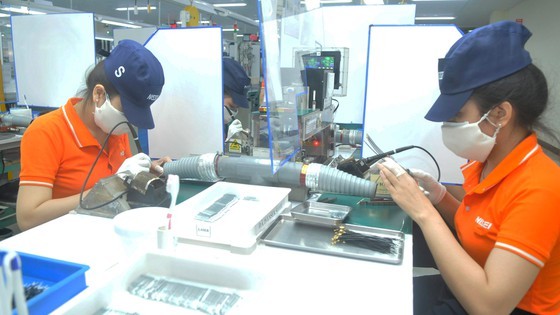 Assoc. Prof-Dr. Hoang Cong Gia Khanh, Dean of University of Economics and Law.
Assoc. Prof-Dr. Hoang Cong Gia Khanh, Dean of University of Economics and Law.
The research team, based on data collected in the first eight months of this year, assessed the economic loss of HCMC during the lockdown period and found that serious damage occurred in individual, household, and business sectors. Supply and demand in the domestic market will recover extremely sluggishly; the unemployment rate of HCMC and the Southern region is likely to increase sharply; the financial capacity of enterprises will be exhausted if there is no prompt support from the State. Although economic growth is forecast to decline and the budget balance is tense this year, the research team believes that the State must play a key role in creating a driving force for economic recovery.
The support policy is urgent, so it is necessary to prioritize the speed of support and accept the deviation rate in the beneficiaries. The administrative procedures must be minimized and ensure the lowest implementation costs on the basis of the existing organizational structure. Each support expenditure target must be evaluated based on foundations, such as the scale of the required resources, the importance and impact of support expenditures from a health and/or economic point of view, the degree of urgency that can be deferred or paid immediately, and the starting time and time frame to implement.
The Government and HCMC have quickly issued and implemented welfare packages to support low-income individuals, households, freelance workers, and small traders, who suffered heavy losses during social distancing. These are very necessary and effective support to timely share economic losses with people, helping to ensure social security.
However, due to long social distancing, the extent of damage is large, and the number of people in need of assistance increases, so the research team recommends that HCMC should consider more welfare support for the people, with the principle of ensuring social security for at least two months for individuals and households experiencing serious and especially serious losses during the economic recovery period. Besides the fact that HCMC continues to supplement the deficit of about VND777 billion according to the level of Resolution No.68, the research team proposes an additional support package of VND14.27 trillion. Of which, VND13.2 trillion is supported by the central budget and VND1.07 trillion from the city budget. This package aims to assist underprivileged students with long-term education, unemployed workers to change jobs, and small traders and business households the second time because of the prolonged shutdown.
The support policy is urgent, so it is necessary to prioritize the speed of support and accept the deviation rate in the beneficiaries. The administrative procedures must be minimized and ensure the lowest implementation costs on the basis of the existing organizational structure. Each support expenditure target must be evaluated based on foundations, such as the scale of the required resources, the importance and impact of support expenditures from a health and/or economic point of view, the degree of urgency that can be deferred or paid immediately, and the starting time and time frame to implement.
The Government and HCMC have quickly issued and implemented welfare packages to support low-income individuals, households, freelance workers, and small traders, who suffered heavy losses during social distancing. These are very necessary and effective support to timely share economic losses with people, helping to ensure social security.
However, due to long social distancing, the extent of damage is large, and the number of people in need of assistance increases, so the research team recommends that HCMC should consider more welfare support for the people, with the principle of ensuring social security for at least two months for individuals and households experiencing serious and especially serious losses during the economic recovery period. Besides the fact that HCMC continues to supplement the deficit of about VND777 billion according to the level of Resolution No.68, the research team proposes an additional support package of VND14.27 trillion. Of which, VND13.2 trillion is supported by the central budget and VND1.07 trillion from the city budget. This package aims to assist underprivileged students with long-term education, unemployed workers to change jobs, and small traders and business households the second time because of the prolonged shutdown.
 Production amid social distancing at an enterprise in Thu Duc City. (Photo: SGGP)
Production amid social distancing at an enterprise in Thu Duc City. (Photo: SGGP)
On a national scale, the study makes recommendations on monetary policy related to debt structure, credit support policies, warranty, and various options for fiscal policy, such as reducing VAT, allowing tax loss carryforward, rescheduling tax payment, and exempting late payment interest. The minimum size of the proposed support package is VND120 trillion and can consider to raise to up to VND250 trillion, about 4 percent of GDP, depending on the plan. As for Ho Chi Minh City, one of the important proposals that the team aims at is a support policy to help businesses limit layoffs, recruit again the number of employees, who have quit or taken unpaid leave before, and attract skilled workers who returned to their hometown during social distancing to return to the city. The support level is 25 percent of the regional minimum salary, applied from September 2021 to March 2022, divided into two periods - until December 2021 and the first quarter of 2022. The size of this support package is about VND4 trillion. HCMC is recommended to expand the current interest rate support program to apply to businesses in the traditional industries and logistics, and the digital economy stimulus program with a total scale of about VND1 trillion per year. HCMC also needs to consider supporting the land fund, socializing the costs of compensation, clearance, and construction to form apartment buildings for workers in export processing zones, industrial parks, and high-tech parks to improve the living conditions of workers, limit the risk of disease outbreaks, and attract workers from other provinces, especially skilled workers, to return to the city soon. Along with that, it is essential to upgrade the infrastructures of wholesale markets to increase the proportion of online transactions under the model of the online commodity trading floor.
 One of the important proposals that the team aims at is a support policy to help businesses limit layoffs. (Photo: SGGP)
One of the important proposals that the team aims at is a support policy to help businesses limit layoffs. (Photo: SGGP)
The ultimate rule is that the size of support packages should be based on budget tolerance to avoid being exposed to excessive risk. The research team believes that creating a driving force for economic recovery in HCMC can be based on five sources acquired in sequence. First, reallocating the city's budget expenditures and using contingencies. Secondly, proposing the central budget to supplement at least VND13.2 trillion for the welfare support package. Thirdly, proposing the Government to allow the issuance of government bonds to allocate capital to the city to promptly disburse for public investment projects that have been approved but are stagnant due to a lack of funding. HCMC pays interest expenses at the interest rate of government bonds corresponding to the capital used. With the low interest rates of government bonds and the effectiveness of the stimulus from public investment, HCMC can afford to pay interest. Fourth, recommending to raise the public debt ceiling of HCMC and create favorable conditions for the city to issue local government bonds to finance investment projects in infrastructures of health and transport sectors, and infrastructure for the digital economy and digital transformation. Fifth, from the 2022 budget year, proposing the central government to approve the adjustment of the budget allocation rate for HCMC from 18 percent to 23 percent. Economic restart and recovery take place longer than the period of social distancing. Therefore, it is necessary to ensure an effective and comprehensive management mechanism from the central level to the Southern key economic region, especially provinces bordering HCMC. The research team thinks that it is necessary to pay special attention that coordinating economic recovery policies must be synchronized with other policies, such as social security, health care, pandemic prevention, vaccination, labor - employment, transportation, and education – training, to achieve thorough consistency, both in awareness and implementation from the grassroots levels to higher ones. Experiences from other countries show that creating a driving force for economic recovery requires horizontal coordination (between ministries and sectors) and vertical counterpart (between levels of the Government) to ensure the balance to bring efficiency.
























